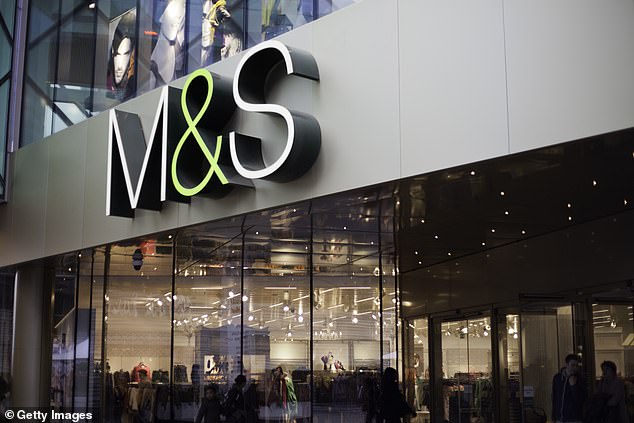Marks & Spencer’s struggle with cyber attackers is showing no sign of abating.
Indeed, the revelation that ‘some personal customer information has been taken’ will be deeply disturbing.
There will be some reassurance from the group’s declaration that usable card and payment details are safe. The firm wouldn’t make such an announcement unless it was sure.
Chief executive Stuart Machin and his team can be grateful for small mercies during the crisis first disclosed on April 21, over the Easter break.
M&S customers, many of them also shareholders, are immensely loyal. A core has stuck with the group despite its travails over the last couple of decades convinced of its quality, trust, value and innovation.
The other comfort is the weather. The company’s embarrassment has coincided with the warmest and driest spring in memory.

Cyber attack: Trade estimates suggest that Marks & Spencer is sacrificing more than £3m of income per day after being targeted by scammers
Empty shelves in food stores are as much about picnics, the beach and early barbecues as about supply chain hold-ups.
Moreover, the good weather has seen people crowd into the stores for summer frocks and tops, T-shirts and shorts.
Britain’s changeable weather is often blamed for the ups and down of retail fortunes. Now it is working to its advantage.
Ahead of the presentation of its first quarter results next week, M&S is keeping schtum about the impact on its finances of present problems. The 12 per cent drop in the share price over the last month tells its own story.
Trade estimates suggest that the company is sacrificing more than £3million of income per day as a result of the attack.
The informed view is that this number, based on previous online sales data, exaggerates the income damage as some online customers are choosing to shop in store instead.
The ease with which M&S security and data was penetrated is deeply troubling.
When M&S eventually gets on top of the problem someone, somewhere will have to take responsibility for a debacle which drags on.
Taylor rules
Extreme caution has been the Bank of England’s default mode since it was so wrong on inflation after the pandemic and Russia’s assault on Ukraine.
Confidence was also sapped by Ben Bernanke’s criticism of poor forecasting and the House of Lords’s charge of ‘group think’ on the interest rate setting Monetary Policy Committee (MPC).
It is encouraging to see external members of the MPC willing to challenge the caution. The newest member, Professor Alan Taylor, is emerging as a voice of sanity.
The degree of disruption from the Trump tariffs may have eased since Liberation Day on April 2 following the 90-day standstill agreement with China.
But there is nothing to suggest that China is fundamentally shifting its economic model with its hunger for Western technology and its mercantilist-driven, export-led model.
The latest labour market and pay data show why the Bank’s sclerotic approach to cutting rates is damaging. As the Labour government tightened fiscal policy, the case for loosening became obvious.
Forward projections from the S&P Purchasing Managers Index and other forecasters, showing output subsiding, are too easily ignored.
Last week’s rate cut by a quarter of a percentage point to 4.25 per cent was inadequate. Taylor is right to advocate cutting rates more boldly in ‘perilous’ trade conditions.
Film noir
Britain’s vibrant film, video and post-production industries are on edge in the wake of Donald Trump’s threat of 100 per cent tariffs on overseas movie output.
Trump claimed the industry in the US is dying. Levies on overseas producers would be taking a hammer to crack a nut.
Better for the White House to listen to silver screen veterans Jon Voight and Sylvester Stallone, Trump’s appointed ambassadors to Hollywood.
In a letter to the President, they suggest the White House tackle the problem by following the example of Canada and Britain, which offer tax incentives to movie makers.
Let the cameras roll.
DIY INVESTING PLATFORMS

AJ Bell

AJ Bell
Easy investing and ready-made portfolios

Hargreaves Lansdown

Hargreaves Lansdown
Free fund dealing and investment ideas

interactive investor

interactive investor
Flat-fee investing from £4.99 per month

InvestEngine

InvestEngine
Account and trading fee-free ETF investing
Trading 212
Trading 212
Free share dealing and no account fee
Affiliate links: If you take out a product This is Money may earn a commission. These deals are chosen by our editorial team, as we think they are worth highlighting. This does not affect our editorial independence.
This article was originally published by a www.dailymail.co.uk . Read the Original article here. .


